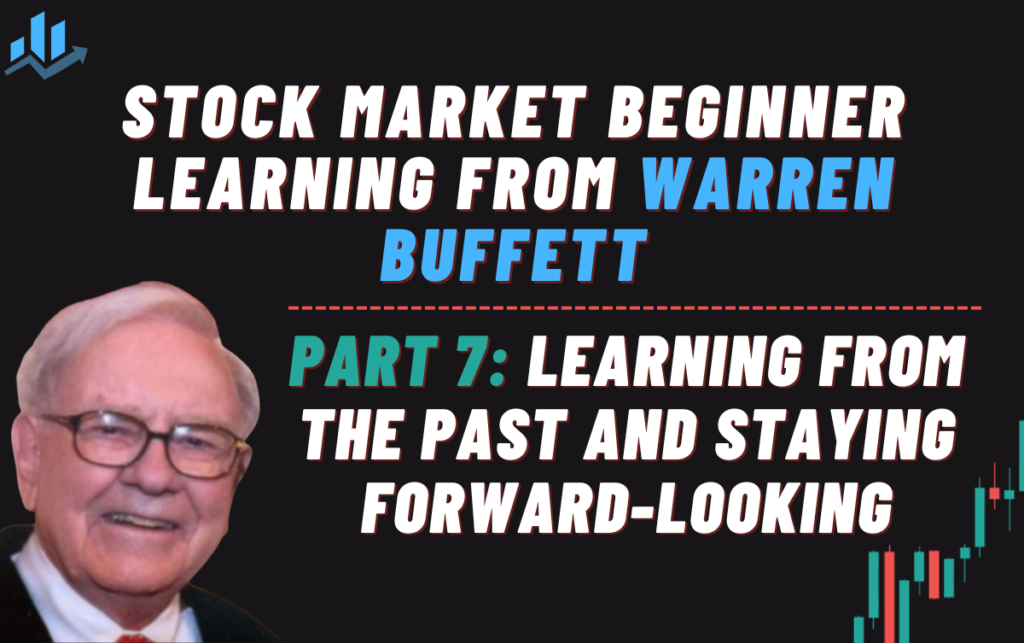
Welcome back to our series on learning from the investment strategies of Warren Buffett, one of the most successful investors of our time. Throughout this journey, we have explored the principles of value investing, risk management, long-term investing, and wealth accumulation. These lessons have provided stock market beginners with a solid foundation for navigating the complex world of investments. Now, as we venture further, we shift our focus to the importance of learning from the past while maintaining a forward-looking investment strategy.
Table of Contents
Toggle1. “In the business world, the rearview mirror is always clearer than the windscreen.”

Understanding the Rearview Mirror and the Windscreen:
“In the business world, the rearview mirror is always clearer than the windscreen.” This quote by Warren Buffett encapsulates an essential lesson for stock market beginners. It reminds us of the significance of understanding and analysing past mistakes and successes as we navigate the complex terrain of the stock market.
Learning from Historical Insights:
To become a successful investor, it is crucial to learn from historical data and experiences. By studying the performance of companies, industries, and market trends in the past, we gain valuable insights that can inform our investment decisions. Analysing past mistakes helps us avoid repeating them, while studying past successes allows us to identify patterns and strategies that have proven effective.
Informed Decision-Making:
By understanding the rearview mirror, we gain clarity about the consequences of certain investment choices and market events. It enables us to make more informed decisions by taking into account the lessons learned from previous experiences. Examining historical data and market cycles allows us to identify recurring patterns, evaluate risks, and gauge the potential performance of investments.
Balancing Historical Insights and a Forward-Looking Approach:
While learning from the past is essential, it is equally important to maintain a forward-looking mindset. The stock market is dynamic and constantly evolving, influenced by changing economic, technological, and social factors. By striking a balance between historical insights and a forward-looking approach, stock market beginners can adapt to current market conditions while keeping an eye on future trends and opportunities.
Benefits of a Balanced Approach:
The significance of understanding the rearview mirror lies in its ability to guide us towards smarter investment choices. It enables us to make decisions based on sound analysis and long-term perspectives and prevents us from letting short-term market fluctuations be our only driving force. By incorporating historical insights into our investment strategies, we can minimise risks and increase the potential for returns.
In Short:
Warren Buffett’s quote reminds us of the importance of understanding and analysing past mistakes and successes in the stock market. By learning from historical data and experiences, we can make informed investment decisions that are grounded in solid analysis. Balancing historical insights with a forward-looking approach allows stock market beginners to navigate the complexities of the market with greater confidence.
2. Learning from Mistakes and Successes:
In the world of stock market investing, there is much to be gained from examining both our mistakes and successes. As stock market beginners, it is essential to embrace a mindset of continuous learning and improvement. By exploring the lessons derived from past experiences, we can refine our investment strategies and enhance our chances of success.
Conducting Post-Analysis:
One of the keys to learning from mistakes and successes is conducting a thorough post-analysis. This involves reflecting on our investment decisions, evaluating the factors that influenced the outcomes, and identifying areas for improvement. By delving into the details, we can gain valuable insights and develop a deeper understanding of the stock market’s dynamics.
Importance of Evaluating Factors
When assessing past investment outcomes, it is crucial to evaluate the factors that contributed to both positive and negative results. By identifying the underlying reasons behind successful investments, we can replicate those strategies in future endeavours. Similarly, by pinpointing the factors that led to mistakes or losses, we can adjust our approach and avoid repeating similar pitfalls.
Warren Buffett’s Lessons:
Warren Buffett, renowned for his successful investment journey, provides us with invaluable lessons derived from his past experiences. Through case studies and anecdotes, we can learn from his approach to investing. Buffett emphasises the importance of thorough research, patience, and a focus on long-term value. He has openly shared his mistakes, such as overpaying for acquisitions or misjudging market trends, which offer valuable insights for stock market beginners.
Applying Lessons to Our Investment Approach:
As stock market beginners, we can apply the lessons derived from past investment mistakes and successes to refine our own strategies. By adopting a mindset of continuous improvement, we can learn from the experiences of successful investors like Warren Buffett and avoid common pitfalls. This includes conducting thorough research, practising patience, and focusing on the long-term value of investments.
In Short:
Learning from both mistakes and successes is a vital aspect of a stock market beginner’s journey. By conducting a post-analysis and evaluating the factors that contributed to past outcomes, we gain valuable insights that can inform our future investment decisions. Warren Buffett’s experiences provide us with specific examples and lessons to learn from. By applying these lessons and continuously refining our investment approach, we can increase our chances of success in the dynamic world of the stock market.
3. Maintaining a Forward-Looking Investment Strategy:
In the fast-paced and ever-changing world of the stock market, it is crucial for beginners to adopt a forward-looking investment strategy. By focusing on the future, we can position ourselves to capitalise on emerging opportunities and navigate the dynamic landscape of investments.
Understanding a Forward-Looking Approach:
A forward-looking investment strategy involves considering future prospects and trends when making investment decisions. It goes beyond analysing historical data and focuses on assessing the growth potential of companies and industries. By incorporating forward-looking factors, such as future earnings potential and emerging market trends, we can make more informed and strategic investment choices.
Staying informed and aware
Staying informed about current trends, market developments, and emerging opportunities is key to maintaining a forward-looking investment strategy. This involves keeping up with financial news, industry reports, and market analysis. By staying aware of the latest advancements and changes in the market, we can identify potential investment opportunities and position ourselves ahead of the curve.
Incorporating Future Growth Prospects:
One of the primary benefits of a forward-looking investment strategy is the ability to consider future growth prospects. By evaluating factors such as industry trends, technological advancements, and market disruptions, we can identify companies with strong growth potential. Investing in industries that are expected to experience substantial growth can enhance our chances of generating attractive returns over the long term.
Balancing Historical Performance and Future Potential:
While understanding past performance is important, it is equally crucial to balance it with future potential. By considering a company’s track record alongside its growth prospects, we can make more well-rounded investment decisions. This approach allows us to capture the potential benefits of emerging opportunities while considering the stability and reliability demonstrated by historical performance.
In Short:
For stock market beginners, embracing a forward-looking investment strategy is essential in today’s rapidly evolving market. By staying informed about current trends, market developments, and emerging opportunities, we can position ourselves to capitalise on future growth prospects. Incorporating forward-looking factors into our investment decisions enables us to make informed choices that align with industry trends and future market dynamics.
4. Balancing Historical Insights and Future Prospects
For stock market beginners, finding the right balance between learning from the past and staying forward-looking is crucial to building a successful investment approach. By understanding the significance of both historical insights and future prospects, beginners can make informed decisions that adapt to changing market conditions.
Adapting to Changing Market Conditions
The stock market is dynamic and constantly affected by a variety of factors, including changes in the economy, technological advancements, and global events. As a beginner, it is essential to adapt investment strategies to changing market conditions. This involves staying vigilant, monitoring market trends, and adjusting investment allocations accordingly. Being flexible allows us to seize new opportunities while mitigating potential risks.
Evaluating Future Potential:
While historical data provides valuable insights, it is equally important to evaluate investment opportunities based on their future potential. Consider factors such as market trends, disruptive innovations, and evolving consumer preferences. Look for companies with sustainable competitive advantages and strong growth prospects. By focusing on future potential, beginners can position themselves in industries poised for long-term success.
Assessing long-term sustainability:
In addition to future prospects, evaluating the long-term sustainability of investments is crucial. Look beyond short-term gains and assess the fundamental strength of the underlying businesses. Consider factors such as the company’s financial health, management expertise, and competitive positioning. Investing in companies with a solid foundation increases the likelihood of long-term success.
Striking the Balance:
Striking a balance between historical insights and future prospects requires a holistic approach. Use historical data as a guide, learning from both successes and failures. Analyse past market cycles and industry trends to gain a deeper understanding of market dynamics. However, avoid being solely anchored to the past. Incorporate forward-looking analysis to identify emerging opportunities and stay ahead of the curve.
In Short:
For stock market beginners, striking a balance between historical insights and future prospects is vital to navigating the ever-changing market landscape. By adapting investment strategies to changing market conditions, evaluating future potential, and assessing long-term sustainability, beginners can make informed decisions that align with their investment goals.
5. Conclusion:
Learning from the Past, Embracing the Future: A Balanced Approach
In the world of stock market investing, striking a balance between learning from the past and embracing the future is key for beginners. By understanding the importance of both historical insights and a forward-looking mindset, beginners can refine their investment strategies and set themselves up for success.
Analysing Past Mistakes and Successes:
One of the most valuable lessons for stock market beginners is to analyse past mistakes and successes. Take the time to reflect on investment decisions, evaluating what worked well and what didn’t. By identifying patterns and understanding the factors that led to both positive and negative outcomes, beginners can learn from their experiences and make more informed decisions moving forward.
Staying informed and adaptable:
The stock market is constantly evolving, influenced by various factors such as economic trends, technological advancements, and geopolitical events. As a beginner, it’s essential to stay informed about current trends, market developments, and emerging opportunities. Be adaptable and ready to adjust investment strategies in response to changing market conditions. This adaptability ensures that you can capitalise on new opportunities and navigate potential risks effectively.
Embracing a Forward-Looking Mindset:
While historical insights are valuable, it’s equally important to maintain a forward-looking investment strategy. Consider future growth prospects, industry trends, and emerging markets. Seek out companies with strong potential for long-term success. By embracing a forward-looking mindset, beginners position themselves to benefit from future opportunities and align their investments with long-term sustainability.
In Short:
For stock market beginners, the journey involves learning from the past and embracing the future. By analysing past mistakes and successes and staying informed, adaptable, and forward-thinking, beginners can refine their investment approach and make informed decisions. The stock market is a dynamic arena, presenting both challenges and opportunities. As we move forward in our blog post series, the next post will explore the importance of discipline and surrounding yourself with success. It will provide valuable insights to help beginners cultivate the mindset and habits necessary for achieving their investment goals.